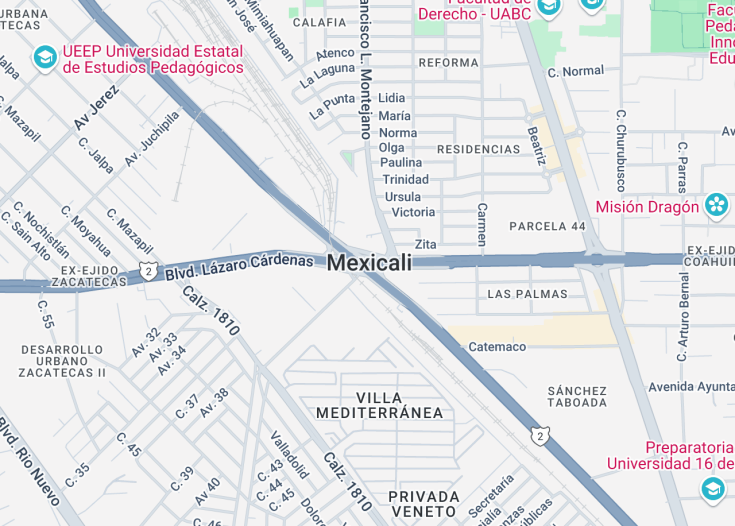Nestled at the northeastern edge of Baja California in Mexico, Mexicali stands as a dynamic city where vibrant culture, rich history, and modernity converge. This capital city, bordering California, offers an eclectic mix of authentic Mexican cuisine, bustling markets, and serene landscapes.
Visitors can explore ancient archaeological sites, vibrant street markets, and lush wine country nearby. Mexicali is also known for its lively festivals, including the famous Baja Prog rock festival and the AgroBaja agricultural fair, providing travelers with unique insights into local traditions and the city’s economic prowess.
When in Mexicali, be sure to sample the local cuisine — especially the city’s renowned Chinese-Mexican fusion dishes, a testament to its diverse cultural fabric.
Planning a visit to Mexicali? Schedule your trip during spring to enjoy mild weather and vibrant local festivals that showcase the city’s rich cultural tapestry.
Mexicali: A Vibrant Border City
| Country | Mexico |
| Time in Mexicali | GMT-7 |
| Language spoken | Spanish |
| Population | 1,049,792 (Federal sources, 2022) |
| Currency | Mexican Peso (MXN $) |
| Airports |
|
Mexicali, the capital city of the State of Baja California, is a dynamic and culturally rich community. As a border city, Mexicali presents a unique blend of Mexican and American influences visible in its daily life, cuisine, and business practices. The city’s geography is characterized by a desert climate, which has also shaped its agricultural development and irrigation techniques, making it an important agricultural center in Mexico.
The history of Mexicali dates back to the early 20th century when it was founded as part of a land reclamation project and quickly became a cultural and economic hub in Northern Mexico. Today, Mexicali is known for its bustling commerce due to its proximity to the United States, with a variety of industries, including manufacturing and services. The city is also home to numerous cultural festivals, such as the Baja Prog international rock festival and the Fiestas del Sol, reflecting its vibrant local traditions and multicultural populace.
Where is Mexicali?
Located in northern Mexico, Mexicali is strategically positioned at the border with Calexico, California, serving as a major gateway between Mexico and the United States.
Distances:
| Route | Distance by car | Time by car |
|---|---|---|
| Mexico City to Mexicali | 1,860 miles | 29 hrs |
| Tijuana to Mexicali | 110 miles | 2 hrs |
| Ensenada to Mexicali | 142 miles | 2.5 hrs |
What is Mexicali famous for?
Mexicali is renowned for its vibrant street food scene, notably its eclectic mix of traditional Mexican tacos and Chinese cuisine, a testament to its diverse immigrant population and cultural exchanges.
History
Pre-colonial Period
Before the arrival of Europeans, the Mexicali area was sparsely inhabited by nomadic indigenous groups, primarily the Cucapá people, who engaged in fishing, hunting, and gathering in the fertile Colorado River delta. These native peoples had adapted to the harsh desert environment and navigated its challenges with skill honed over centuries.
1900s-1930s: Foundation and Agricultural Development
Mexicali’s official foundation dates back to the early 20th century when the Colorado River Land Company, a U.S.-based agriculture firm, began developing the surrounding desert into a fertile agricultural area. The company established an irrigation system, which transformed the arid land into one of the most productive agricultural zones in Mexico. The city was officially founded in 1903 and named Mexicali by combining “Mexico” and “California,” reflecting its position on the border and its binational influences.
1940s-1970s: Economic Growth and Urbanization
Following World War II, Mexicali experienced significant industrial growth, especially in the maquiladora (assembly plants) industry, which was boosted by its proximity to the United States. This period marked a shift from primarily agricultural to industrial economic activities. The city’s population grew rapidly as people from other parts of Mexico moved to Mexicali for job opportunities.
1980s-Present: Diversification and Modern Challenges
In recent decades, Mexicali has diversified its economy beyond agriculture and maquiladoras. It has developed sectors such as aerospace, automotive, and information technology. However, the city faces modern challenges such as environmental concerns over water use in agriculture and issues related to border politics and migration. Despite these challenges, Mexicali continues to be a cultural and economic hub in the region, reflecting a blend of Mexican and American influences over its storied past.
Visit Mexicali
What to see and do in Mexicali
Mexicali offers a rich blend of cultural and natural attractions that cater to a variety of interests. In the city center, the Catedral de Nuestra Señora de Guadalupe stands as a historic landmark, showcasing beautiful architecture.
For museum enthusiasts, the Museo Sol del Niño offers interactive exhibits focused on science and technology. Nature lovers can explore the nearby Cucapá and El Mayor Sierras or enjoy bird watching at the Colorado River Delta.
- Visit the Catedral de Nuestra Señora de Guadalupe
- Explore interactive exhibits at Museo Sol del Niño
- Enjoy nature at the Colorado River Delta
Festivals and Events
Mexicali is vibrant with cultural festivities throughout the year. The Agrobaja, a notable agricultural and fishing fair, takes place annually in March, drawing agricultural enthusiasts from across North America.
In October, the city celebrates the Cachanilla Culture Festival, which features music, dance, and local crafts, showcasing the rich cultural tapestry of the region.
Best time to visit Mexicali
The ideal time to visit Mexicali is during the cooler months from November to March. During this period, the weather is more temperate, making it comfortable for exploring the city’s attractions and participating in outdoor activities.
Is Mexicali worth visiting?
Indeed, Mexicali is worth a visit for its unique blend of cultural heritage and modern attractions. The city offers a rich historical background, diverse cultural experiences, and a range of activities that cater to different interests.
Whether you’re a history buff, nature enthusiast, or cultural explorer, Mexicali provides a distinct and enriching experience that is both educational and enjoyable.









